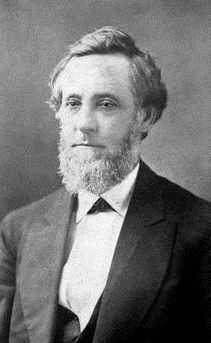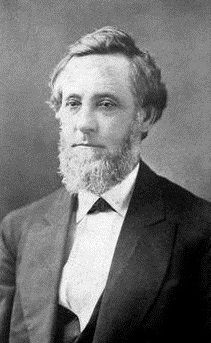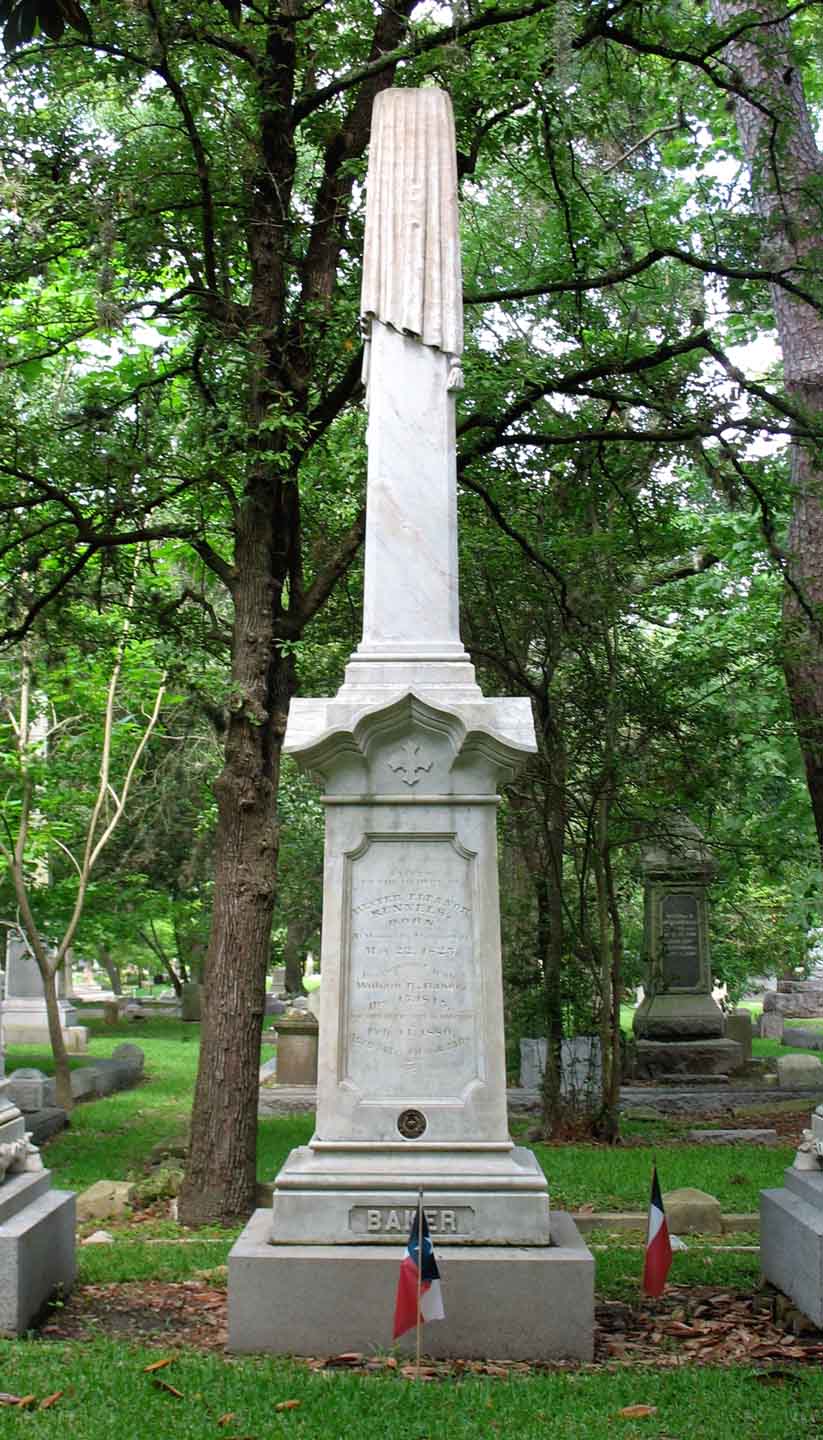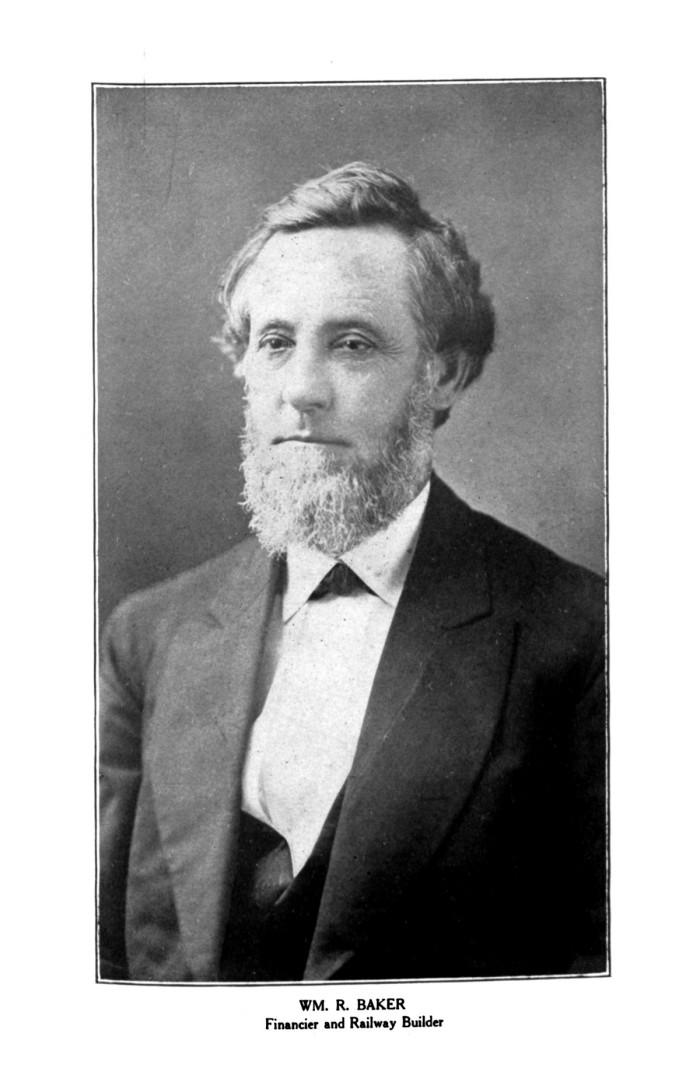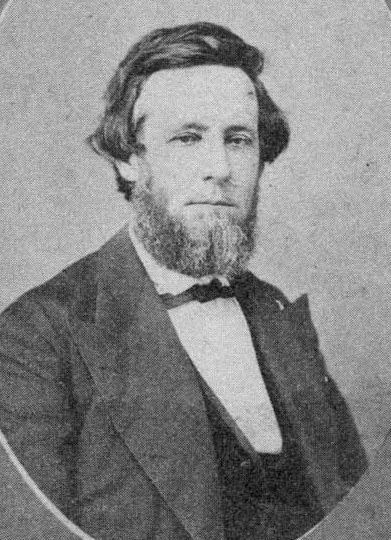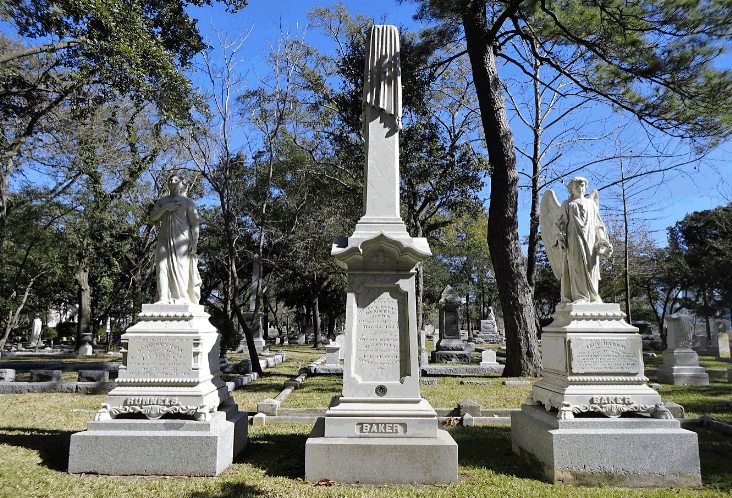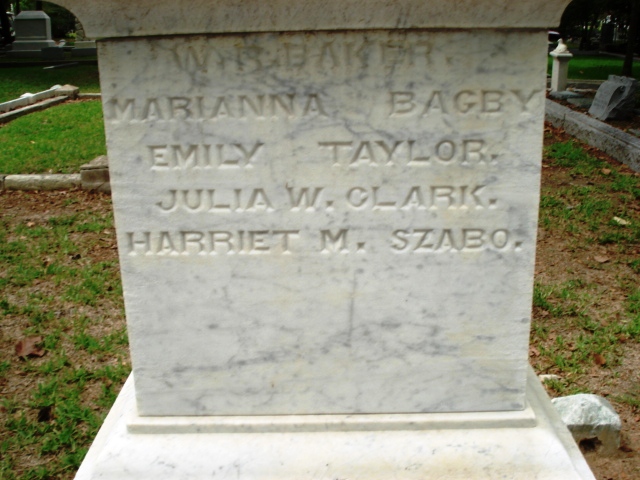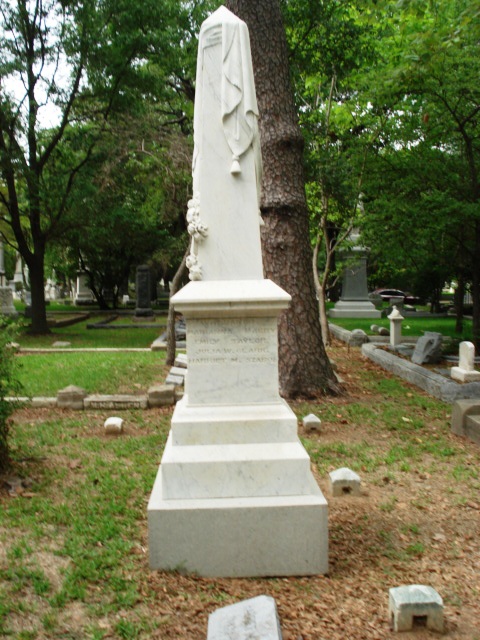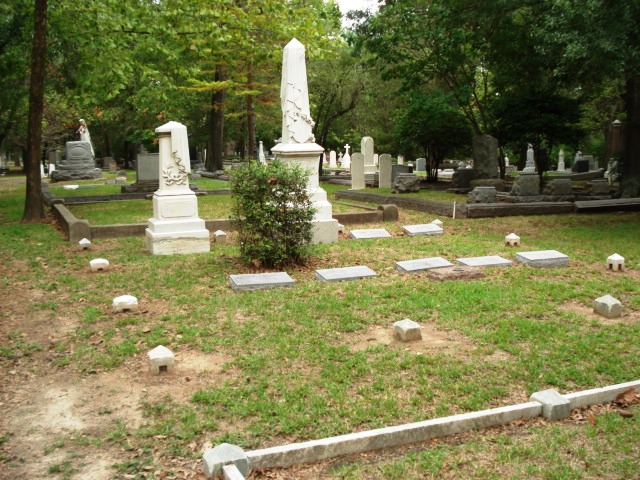Husband of Hester Eleanor Runnels, Married December 15, 1845
William Robinson Baker, Houston mayor, Texas state legislator, and railroad official, the son of Asa and Hannah (Robinson) Baker, was born in Baldwinsville, New York, on May 21, 1820. He moved to Texas in 1837 and worked as a bookkeeper for the Houston Town Company. In 1841 he was elected Harris county clerk, a position he filled for the next sixteen years. He married Hester Eleanor Runnels on December 15, 1845, and the couple had one child. Between 1852 and 1877 Baker served as secretary, vice president, general manager, president, and board member of the Houston and Texas Central Railway. In 1874 he was elected as a Democrat to the state Senate and from 1880 to 1886 served as mayor of Houston. He purchased an interest in The Houston Post newspaper in 1883 and was president of the City Bank of Houston. He was a Mason. He died on April 30, 1890.
Bio provided by: Findagrave Member Dan Member #46920253
~
BAKER, WILLIAM R.
No reader of the biographical literature of this country can have failed to note the fact that the qualities of mind and the training obtained by them in winning the higher grades of success in business, are available for other uses than those of commerce. It is not an unfrequent thing to see a successful merchant become the projector of some enterprise of large proportions, ably fill a position requiring a high order of executive ability, amassing wealth all the while, and then round out his career by a few terms in the law-making bodies, either of his State or the nation. To thus develop ability with circumstances, and turn one's hand readily to opportunities offered by the tides of fortune, seems to be the especial gift of the American character, and there are examples, in plenty, in all the avenues of trade, finance and legislation - in all the departments of industrial development - which go to confirm and emphasize the truth of this statement.
William Robinson Baker, who was for more than a half century a prominent figure in the history of the city of Houston, and who left, in a full measure, the imprint of his talents and character on the industries and interests of this place, was born in Baldwinsville, Onondaga county, New York, on the 21st day of May, 1820. His parents were Asa and Hannah Robinson Baker, who were born, the father in Cheshire county, New Hampshire, and the mother in Philadelphia, Pennsylvania. Asa Baker was a son of Alden S. Baker, a Revolutionary soldier, and himself a Captain in the war of 1812, the family coming originally of English stock. Asa Baker married Hannah Robinson, a daughter of William Robinson, a prominent merchant and importer of Philadelphia, and settled, sometime between 1815 and 1820, in Onondaga county. New York, where he followed his calling as a civil engineer for a number of years, and was interested, at different times, in a small way, in the mercantile business. He died in that county in 1851. His widow survived many years, dying at the home of her daughter, Mrs. T. M. Bagby, in the city of Houston, June 24, 1889.
William R. Baker was reared mainly in his native place, and his educational advantages were of the best for the times, particularly so with respect to his home training, his father being a man of superior mental attainments, the benefits of which were bestowed without stint on the son. At the age of twelve he began the serious duties of life for himself, and his earnings, meagre as they were, formed at this time the basis of his subsistance. He was industrious in habits, and managed, by hard application and the economical use of time, to acquire some knowledge of books, particularly bookkeeping and surveying. He had a natural turn for mathematics, and the mastery of any branch of this science was comparatively easy for him. In 1837 he came to Texas, and located at Houston.
During the first year of his residence here he was bookkeeper for the Houston Town Company. Then, in 1838 he engaged in the mercantile business in a small way, and was so engaged until February, 1841, when he became a candidate for the office of County Clerk, was elected to this office, and held it by successive re-elections for sixteen years. While in this position he began to trade in lands, at which he was very prosperous, acquiring a large amount of real estate and an extensive knowledge of the business. In 1852, when the Houston & Texas Central Railway was organized, he interested himself in it, became one of its board of directors, and, in connection with a number of other capitalists of Houston, built that road. This was no unimportant undertaking for those days, for railroad building then was in its infancy in Texas. The obstacles met were great, and to most other men these obstacles would have been insurmountable. Mr. Baker was identified with the road from its inception until its future was assured, and in fact until it became one of the chief railway properties in the State. He served successively as secretary, vice-president, president, and again vice-president and general manager, severing his connection with the road in 1877, only when he sold his interest in it for the purpose of retiring from active business pursuits.
Mr. Baker was always a Democrat, and took active interest in politics. In 1874 his friends saw fit to have him placed in the field as a candidate for the State Senate, and, after a spirited contest, he was elected. His career as a member of that body was marked by his sterling common sense, his broad and liberal views and the business-like manner in which he dispatched matters falling into his hands for attention. From 1880 to 1886 he served as Mayor of the city of Houston, being called to this position and retained in it by the general consent of the citizens who were anxious for a vigorous administration of the city's affairs. An authority says, "He took hold of Houston when it was in the mud and darkness, and soon inaugurated a system of public improvements which now stand as a monument to his worth. He brought order out of chaos, reduced the city's indebtedness, paved the streets, and set on foot the movement which resulted in the present electric-light system."
In 1883 he purchased an interest in the Houston Post, which he retained for six years, and while connected with this paper spared neither money nor effort to make it what it really became, one of the best papers in the South. He was also president of the City Bank of Houston at the time of its failure, and on account of the collapse of that institution suffered very heavily in his private means, though justice to his memory requires the statement that he was an innocent victim in that disaster. The bank was in the worst possible condition at the time he was induced, by misrepresentation, to take stock in it.
On the 15th day of December, 1845, Mr. Baker married Miss Hester Eleanor Runnels, a daughter of Hosea R. Runnels, of Mississippi, and a niece of ex-Governor Hiram G. Runnels, of that State, in whose family Mrs. Baker was reared after her father's death. The issue of this union was one child, a daughter, Lucy, born July 13, 1848. She became an accomplished lady, and on the 15th, of June, 1869, was married to Captain E. P. Turner, of Houston. She died June 2, 1873, leaving an infant son, William Baker Turner. On the 14th of February, 1880, Mrs. Baker died.
Having satisfied his sense of duty to his fellow-citizens by his six years' service as their chief executive, with ample means to gratify all his wants, and with a sincere desire to pass the remainder of his life on earth in peace, Mr. Baker retired from active business pursuits and was living in the enjoyment of his well-earned repose at the time of his death. He died April 30, 1890, almost without warning, being stricken with cerebral effusion about the hour of nine one evening, from the effects of which he expired about the hour of six the next evening. News of his death was received with deep regret not only by the people of this city in which he had so long lived, but also by the people throughout this entire section of the State to whom his career was well known and with whom he had had intimate business and social relations.
Mr. Baker was a member of the Masonic fraternity for more than fifty years, and was a devout believer in the teachings and practices of that most ancient and honorable order. His religion was that of the nineteenth century; full faith in the principles of morality as taught by Christianity, but entertaining an honest doubt in the authenticity of the Scriptures as interpreted by the various religious denominations.
Five feet, ten inches in height, and weighing between 170 and 180 pounds, of dark complexion, brown eyes, high, intellectual forehead, and a clear, untroubled countenance, he was a man whom one would notice in an assembly of a hundred men and would easily remember for his distinct individuality. While he was strong in his likes and dislikes, clear-cut and forceful in the expression of his views, he meant to accord to everyone the same privileges which he claimed for himself, and was at heart kind and affectionate. He is spoken of in terms of sincere affection by those who knew him long and intimately. One of the most marked tributes to his memory, as indeed it is one of the most marked tributes that can be paid to the memory of any man, is the oft-repeated statement made by his associates, that he was very rarely ever known to speak unkindly of others. Source: History of Texas Biographical History of the Cities of Houston and Galveston (1895),
Husband of Hester Eleanor Runnels, Married December 15, 1845
William Robinson Baker, Houston mayor, Texas state legislator, and railroad official, the son of Asa and Hannah (Robinson) Baker, was born in Baldwinsville, New York, on May 21, 1820. He moved to Texas in 1837 and worked as a bookkeeper for the Houston Town Company. In 1841 he was elected Harris county clerk, a position he filled for the next sixteen years. He married Hester Eleanor Runnels on December 15, 1845, and the couple had one child. Between 1852 and 1877 Baker served as secretary, vice president, general manager, president, and board member of the Houston and Texas Central Railway. In 1874 he was elected as a Democrat to the state Senate and from 1880 to 1886 served as mayor of Houston. He purchased an interest in The Houston Post newspaper in 1883 and was president of the City Bank of Houston. He was a Mason. He died on April 30, 1890.
Bio provided by: Findagrave Member Dan Member #46920253
~
BAKER, WILLIAM R.
No reader of the biographical literature of this country can have failed to note the fact that the qualities of mind and the training obtained by them in winning the higher grades of success in business, are available for other uses than those of commerce. It is not an unfrequent thing to see a successful merchant become the projector of some enterprise of large proportions, ably fill a position requiring a high order of executive ability, amassing wealth all the while, and then round out his career by a few terms in the law-making bodies, either of his State or the nation. To thus develop ability with circumstances, and turn one's hand readily to opportunities offered by the tides of fortune, seems to be the especial gift of the American character, and there are examples, in plenty, in all the avenues of trade, finance and legislation - in all the departments of industrial development - which go to confirm and emphasize the truth of this statement.
William Robinson Baker, who was for more than a half century a prominent figure in the history of the city of Houston, and who left, in a full measure, the imprint of his talents and character on the industries and interests of this place, was born in Baldwinsville, Onondaga county, New York, on the 21st day of May, 1820. His parents were Asa and Hannah Robinson Baker, who were born, the father in Cheshire county, New Hampshire, and the mother in Philadelphia, Pennsylvania. Asa Baker was a son of Alden S. Baker, a Revolutionary soldier, and himself a Captain in the war of 1812, the family coming originally of English stock. Asa Baker married Hannah Robinson, a daughter of William Robinson, a prominent merchant and importer of Philadelphia, and settled, sometime between 1815 and 1820, in Onondaga county. New York, where he followed his calling as a civil engineer for a number of years, and was interested, at different times, in a small way, in the mercantile business. He died in that county in 1851. His widow survived many years, dying at the home of her daughter, Mrs. T. M. Bagby, in the city of Houston, June 24, 1889.
William R. Baker was reared mainly in his native place, and his educational advantages were of the best for the times, particularly so with respect to his home training, his father being a man of superior mental attainments, the benefits of which were bestowed without stint on the son. At the age of twelve he began the serious duties of life for himself, and his earnings, meagre as they were, formed at this time the basis of his subsistance. He was industrious in habits, and managed, by hard application and the economical use of time, to acquire some knowledge of books, particularly bookkeeping and surveying. He had a natural turn for mathematics, and the mastery of any branch of this science was comparatively easy for him. In 1837 he came to Texas, and located at Houston.
During the first year of his residence here he was bookkeeper for the Houston Town Company. Then, in 1838 he engaged in the mercantile business in a small way, and was so engaged until February, 1841, when he became a candidate for the office of County Clerk, was elected to this office, and held it by successive re-elections for sixteen years. While in this position he began to trade in lands, at which he was very prosperous, acquiring a large amount of real estate and an extensive knowledge of the business. In 1852, when the Houston & Texas Central Railway was organized, he interested himself in it, became one of its board of directors, and, in connection with a number of other capitalists of Houston, built that road. This was no unimportant undertaking for those days, for railroad building then was in its infancy in Texas. The obstacles met were great, and to most other men these obstacles would have been insurmountable. Mr. Baker was identified with the road from its inception until its future was assured, and in fact until it became one of the chief railway properties in the State. He served successively as secretary, vice-president, president, and again vice-president and general manager, severing his connection with the road in 1877, only when he sold his interest in it for the purpose of retiring from active business pursuits.
Mr. Baker was always a Democrat, and took active interest in politics. In 1874 his friends saw fit to have him placed in the field as a candidate for the State Senate, and, after a spirited contest, he was elected. His career as a member of that body was marked by his sterling common sense, his broad and liberal views and the business-like manner in which he dispatched matters falling into his hands for attention. From 1880 to 1886 he served as Mayor of the city of Houston, being called to this position and retained in it by the general consent of the citizens who were anxious for a vigorous administration of the city's affairs. An authority says, "He took hold of Houston when it was in the mud and darkness, and soon inaugurated a system of public improvements which now stand as a monument to his worth. He brought order out of chaos, reduced the city's indebtedness, paved the streets, and set on foot the movement which resulted in the present electric-light system."
In 1883 he purchased an interest in the Houston Post, which he retained for six years, and while connected with this paper spared neither money nor effort to make it what it really became, one of the best papers in the South. He was also president of the City Bank of Houston at the time of its failure, and on account of the collapse of that institution suffered very heavily in his private means, though justice to his memory requires the statement that he was an innocent victim in that disaster. The bank was in the worst possible condition at the time he was induced, by misrepresentation, to take stock in it.
On the 15th day of December, 1845, Mr. Baker married Miss Hester Eleanor Runnels, a daughter of Hosea R. Runnels, of Mississippi, and a niece of ex-Governor Hiram G. Runnels, of that State, in whose family Mrs. Baker was reared after her father's death. The issue of this union was one child, a daughter, Lucy, born July 13, 1848. She became an accomplished lady, and on the 15th, of June, 1869, was married to Captain E. P. Turner, of Houston. She died June 2, 1873, leaving an infant son, William Baker Turner. On the 14th of February, 1880, Mrs. Baker died.
Having satisfied his sense of duty to his fellow-citizens by his six years' service as their chief executive, with ample means to gratify all his wants, and with a sincere desire to pass the remainder of his life on earth in peace, Mr. Baker retired from active business pursuits and was living in the enjoyment of his well-earned repose at the time of his death. He died April 30, 1890, almost without warning, being stricken with cerebral effusion about the hour of nine one evening, from the effects of which he expired about the hour of six the next evening. News of his death was received with deep regret not only by the people of this city in which he had so long lived, but also by the people throughout this entire section of the State to whom his career was well known and with whom he had had intimate business and social relations.
Mr. Baker was a member of the Masonic fraternity for more than fifty years, and was a devout believer in the teachings and practices of that most ancient and honorable order. His religion was that of the nineteenth century; full faith in the principles of morality as taught by Christianity, but entertaining an honest doubt in the authenticity of the Scriptures as interpreted by the various religious denominations.
Five feet, ten inches in height, and weighing between 170 and 180 pounds, of dark complexion, brown eyes, high, intellectual forehead, and a clear, untroubled countenance, he was a man whom one would notice in an assembly of a hundred men and would easily remember for his distinct individuality. While he was strong in his likes and dislikes, clear-cut and forceful in the expression of his views, he meant to accord to everyone the same privileges which he claimed for himself, and was at heart kind and affectionate. He is spoken of in terms of sincere affection by those who knew him long and intimately. One of the most marked tributes to his memory, as indeed it is one of the most marked tributes that can be paid to the memory of any man, is the oft-repeated statement made by his associates, that he was very rarely ever known to speak unkindly of others. Source: History of Texas Biographical History of the Cities of Houston and Galveston (1895),
Family Members
Advertisement
Advertisement
